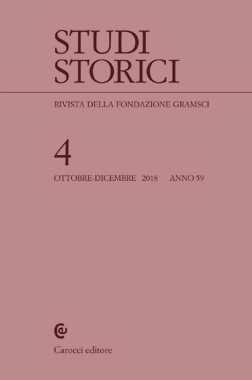
aprile - giugno 2010 anno 51
Sommario e abstract degli articoli
Innocenzo Cervelli, pp. 281-365
L’«Evasion» del dottor Lacambre. Frammenti tra il 1848 e la Comune
Dr Lacambre’s «Evasion». Fragments between 1848 and the Paris Commune
Cirylle Lacambre’s pamphlet Evasion des prisons du conseil de guerre. Episode de juin 1848 (1865); the third part of Gustave Flaubert’s novel L’éducation sentimentale (1869); George Sand’s preface to the play Cadio (1868); and Chapter XI of Jules Vallès’ work L’Insurgé are studied as examples of how the days of June 1848 are remembered, during the final years of the Second French Empire, in their conceptual connection to the Paris Commune.
Francesco Torchiani, pp. 367-390
Garin, «Belfagor» e i «conti» con Croce
Garin, «Belfagor», and Crocianism
This essay analyzes Garin’s contribution to «Belfagor», the review founded by Luigi Russo in 1946 and directed by him until his death in 1961. Over those 15 years, Garin, a professor of the History of Philosophy at Florence, contributed to the acerbic publication articles on Renaissance thought, portraits of such humanists as Marsilio Ficino and Leonardo da Vinci, and a large number of reviews. This article focuses especially on contributions the philosopher made to the critical knowledge of Italian culture between the two World Wars. The dialogue with Russo – who during his lifetime went from juvenile Gentilianism to Crocianism, and then from idealism to «heretical» Marxism – gave Garin the opportunity to revise an important page of our culture and, at the same time, figures like Croce and Guido De Ruggiero. Again, «Belfagor» was the first Italian periodical that gave space to reflections on Garin’s activity as philologist, historian, and philosopher.
Fiamma Lussana, pp. 391-402
Narrare una storia universale. «L’uomo che verrà» e la storiografia gramsciana «dal basso»
Telling a universal history. «L’uomo che verrà» and the Gramscian historiography «from below»
Giorgio Diritti’s film L’uomo che verrà tells of the violence of war that befell Monte Sole’s peasant community. It was a Nazi massacre, and, like all massacres, it was a chronicle of tragedy and death, claiming nearly 800 victims guilty merely of having fought desperately against the War’s violence. Men, women, children, and the partisan community are the leading players in the film, which gives voice to humble people from the Gramscian perspective – «from below». Poor country people and partisans withstand the tragedy of war, defending land, home, and family. Not heroes, they are, first and foremost, common people. E.J. Hobsbawm takes the same perspective, starting with his Primitive Rebels (1959), where he devotes major studies to rebel peasants, brigands, and rabble rousers. Like brigands, partisans are often poor country people: the myth of the «patriot-partisan» arose in the Second postwar period.
Alexander Höbel, pp. 403-459
Pci, sinistra cattolica e politica estera (1972-1973)
PCI, the Catholic Left, and foreign policy (1972-1973)
During détente in the early Seventies, the idea of gradually overcoming the military blocs appeared on the international scene. In Italy, the PCI and the Catholic Left were major players in this endeavour. Moreover, the Vietnam War paved the way for a sort of parallel diplomacy, in which the Vatican and the PCI played an important role. Meanwhile, Berlinguer’s proposal emerged of a Europe that was «neither anti-Soviet nor anti-American ». The economic crisis sharpened competition between the United States and the EEC, strengthening the idea of an autonomous European initiative among Catholic leaders as well. Chile’s golpe reinforced, within the PCI, the strategy of large alliances. Lastly, the energy crisis highlighted the problem of the «development model» and allowed further convergences with the Catholic Left to emerge. Foreign policy thus remained a delicate subject, but was at the same time a remarkable element in the concept of compromesso storico.
Ricerche
Michelangela Di Giacomo, pp. 461-494
Identità eurocomunista: la traiettoria del Pce negli anni Settanta
Euro-communist identity: the PCE’s evolution during the 1970’s
Between 1968 and the late 1970’s, the communist parties of Italy, France, and Spain converged in an attempt to redefine certain features of their own identity, adapting their function to a changed society. Due to its size and precarious structure, the Spanish Communist Party (PCE) was often dismissed by studies to a marginal role, though at times it had expressed itself more forcefully than other political partnerships interested in the Euro-communist strategy. This article retrace the path to Euro-communism, propose a new organization in periods, and describe the PCE’s evolution from a typically Third-Internationalist position to one embracing Soviet and other European partnerships (in particular the Italian Communist Party), as it welcomed Italy’s appreciation for democracy and the national road to socialism as positive values.
Sfoglia gli altri numeri dell’anno 51 / 2010
Elenco dei fascicoli pubblicati dal 2010
Seleziona fascicolo...
- anno 65 / 2024
- 1
- anno 64 / 2023
- 1
- 2
- 3
- 4
- anno 63 / 2022
- 1
- 2
- 3
- 4
- anno 62 / 2021
- 1
- 2
- 3
- 4
- anno 61 / 2020
- 1
- 2
- 3
- 4
- anno 60 / 2019
- 1
- 2
- 3
- 4
- anno 59 / 2018
- 1
- 2
- 3
- 4
- anno 58 / 2017
- 1
- 2
- 3
- 4
- anno 57 / 2016
- 1
- 2
- 3
- 4
- anno 56 / 2015
- 1
- 2
- 3
- 4
- anno 55 / 2014
- 1
- 2
- 3
- 4
- anno 54 / 2013
- 1
- 2
- 3
- 4
- anno 53 / 2012
- 1
- 2
- 3
- 4
- anno 52 / 2011
- 1
- 2
- 3
- 4
- anno 51 / 2010
- 1
- 2
- 3
- 4
